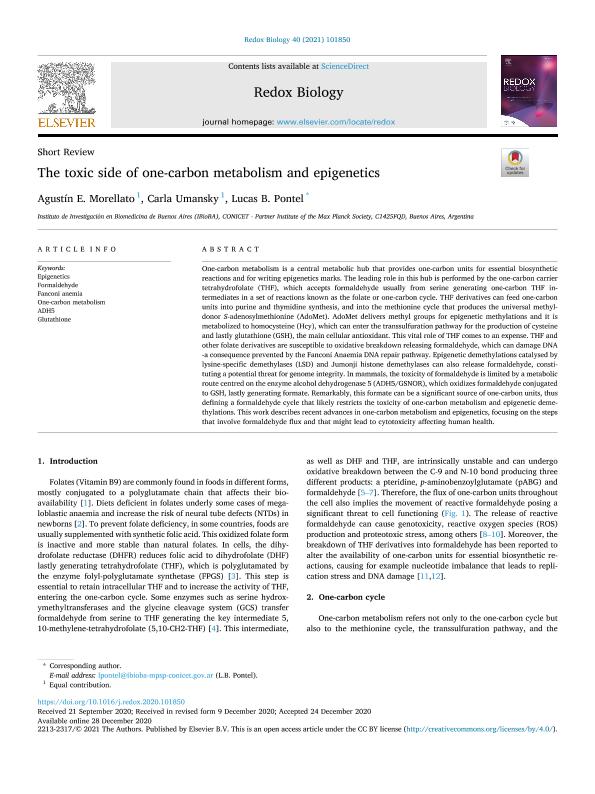Artículo
The toxic side of one-carbon metabolism and epigenetics
Fecha de publicación:
04/2021
Editorial:
Elsevier
Revista:
Redox Biology
ISSN:
2213-2317
Idioma:
Inglés
Tipo de recurso:
Artículo publicado
Clasificación temática:
Resumen
One-carbon metabolism is a central metabolic hub that provides one-carbon units for essential biosynthetic reactions and for writing epigenetics marks. The leading role in this hub is performed by the one-carbon carrier tetrahydrofolate (THF), which accepts formaldehyde usually from serine generating one-carbon THF intermediates in a set of reactions known as the folate or one-carbon cycle. THF derivatives can feed one-carbon units into purine and thymidine synthesis, and into the methionine cycle that produces the universal methyl-donor S-adenosylmethionine (AdoMet). AdoMet delivers methyl groups for epigenetic methylations and it is metabolized to homocysteine (Hcy), which can enter the transsulfuration pathway for the production of cysteine and lastly glutathione (GSH), the main cellular antioxidant. This vital role of THF comes to an expense. THF and other folate derivatives are susceptible to oxidative breakdown releasing formaldehyde, which can damage DNA -a consequence prevented by the Fanconi Anaemia DNA repair pathway. Epigenetic demethylations catalysed by lysine-specific demethylases (LSD) and Jumonji histone demethylases can also release formaldehyde, constituting a potential threat for genome integrity. In mammals, the toxicity of formaldehyde is limited by a metabolic route centred on the enzyme alcohol dehydrogenase 5 (ADH5/GSNOR), which oxidizes formaldehyde conjugated to GSH, lastly generating formate. Remarkably, this formate can be a significant source of one-carbon units, thus defining a formaldehyde cycle that likely restricts the toxicity of one-carbon metabolism and epigenetic demethylations. This work describes recent advances in one-carbon metabolism and epigenetics, focusing on the steps that involve formaldehyde flux and that might lead to cytotoxicity affecting human health.
Palabras clave:
ADH5
,
EPIGENETICS
,
FANCONI ANEMIA
,
FORMALDEHYDE
,
GLUTATHIONE
,
ONE-CARBON METABOLISM
Archivos asociados
Licencia
Identificadores
Colecciones
Articulos(IBIOBA - MPSP)
Articulos de INST. D/INV.EN BIOMED.DE BS AS-CONICET-INST. PARTNER SOCIEDAD MAX PLANCK
Articulos de INST. D/INV.EN BIOMED.DE BS AS-CONICET-INST. PARTNER SOCIEDAD MAX PLANCK
Citación
Morellato, Agustín Ezequiel; Umansky, Carla; Pontel, Lucas Blas; The toxic side of one-carbon metabolism and epigenetics; Elsevier; Redox Biology; 40; 4-2021; 1-7
Compartir
Altmétricas




